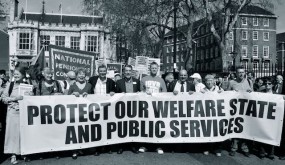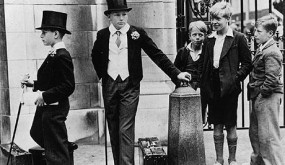
Osborne announces cuts that take the UK economy back to 1948
“What is the point of GDP growth, if the benefits are not increasing the quality of our lives? The only reason for the public to care about economic growth, is the promise that it equates to a better life for us all.” In light of this week’s Autumn Statement, Scriptonite Daily reviews the economic ‘success’ of the Coalition Government.

Boris Johnson says super rich are an ‘oppressed minority’ worthy of our ‘humble thanks’ - time for a reality check
“Boris Johnson, Mayor of London, today used his platform of a column in the Daily Telegraph newspaper to argue that the super-rich are a ‘put upon minority’ like homeless people or the travelling community.” Scriptonite looks at why Boris Johnson’s recent comments on the super-rich are wrong.

Service before self
“Above all I want the work that I do to matter and make a difference to people’s lives; only then will the internal critic of self-doubt and guilt quieten down for a while.” A guest blogger at We Love Local Government describes the very human impact of the cuts.

Despite all the propaganda, Britain remains liberal and collectivist
“One lesson for Labour might be that it needs to be more bold and speak above the heads of the media and more directly to people, to enable it to connect with the more liberal and collectivist attitudes that, despite all the propaganda, still dominate amongst the public.” Steve Hilditch argues that Britain remains a liberal and collectivist society.

Channel 4′s Benefit Britain and the expansion of the Welfare State after 1948
“Moreover, thanks to the Coalition, poverty in Britain is actually increasing. What we need are fewer programmes purporting to show how generous modern welfare provision, and more that show how the Coalition’s policies and cuts are actually making it more widespread.” Beastrabban takes aim at Channel 4′s much-criticised Benefits Britain programme.

Benefits Britain
“Channel 4, you let us down. You hurt me. It’s your fault if people with invisible disabilities felt like Twitter was rounding on us during and after your programme.” Law Geek is not happy with the way Channel 4 portrayed disabled people in their Benefits Britain programme.

Benefits Britain and the rise of poverty porn
“They used to have a word for media programming used to distort public mood in favour of a political goal by using misrepresented data: propaganda.” Scriptonite argues that we must demand better from the media in how they portray the welfare state.

The (invisible) problem of riches
Last week on this blog, Jonathan Bradshaw argued that our ‘benefits system’ wasn’t broken and highlighted how the tax system in the UK did not do anything to help tackle poverty as it failed to redistribute wealth effectively. Whilst the tax system may not directly redistribute wealth, if everyone (including organisations) paid the tax that they were […]
Ways of extending the welfare state to the poor
“Part of the problem, in my view, is the ‘sloganization of social policy’ outside of academia, which leads to politicians framing the discussion as being a problem between ‘shirkers and workers’, ‘strivers and skivers’ and ‘hard-working families’ vs ‘troubled families’.” Stephen Crossley proposes some alternative, more thoughtful slogans for social policy.
On social security, universality and public support for the welfare state
As the Government moots the idea of means-testing certain benefits for pensioners, Owen Jones writes for The Independent that universality is an integral component of a good welfare state. In response, Sunny Hundal writes that universality does not automatically generate support for social security. In defence of his view, Sunny argues (quite rightly) that overall support for […]
Eight things I like about universal benefits…
There’s been a lot of discussion about benefits over the last few years – and in particular, how the Labour Party, or any other ‘progressive’ party, should deal with them in times of austerity. With Liam Byrne as Shadow Secretary of State for Work and Pensions it has been hard to differentiate between Labour and […]

Women and children last?
“The criticisms of the Thatcher administration …are, in my opinion, very similar to the criticisms that are being voiced today about a wide range of issues and groups affected by welfare reform and ‘austerity measures’.” Stephen Crossley at the North East Child Poverty Commission draws some parallels between governments then and now.

Guerilla Voice: Dividing lines
The story of the week has undoubtedly been class. One debate on class - the ‘strivers’ and ‘skivers’ argument - has been used by the political class to distract from the debate we should be having, about the widening inequalities in wealth, power and influence that have undermined our society and politics.